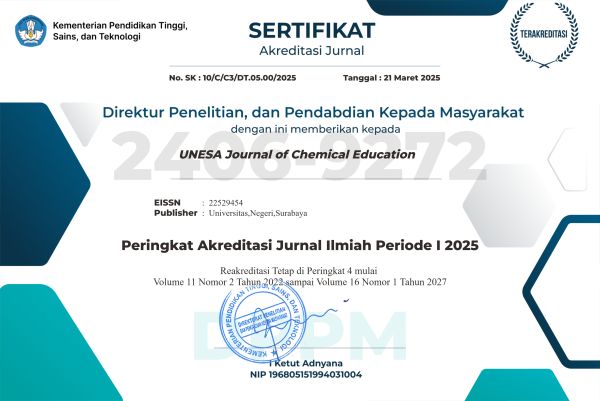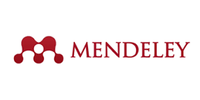EFEKTIFITAS PENGGUNAAN MEDIA PEMBELAJARAN BERBASIS AUGMENTED REALITY DALAM PEMBELAJARAN KIMIA DI ERA SOCIETY 5.0
DOI:
https://doi.org/10.26740/ujced.v13n2.p86-99Keywords:
Augmented reality, Chemistry learning, Society Era 5.0Abstract
Penelitian ini bertujuan untuk melihat efektivitas penggunaan media augmented reality (AR) dalam pembelajaran kimia di era society 5.0. Dalam penelitian ini, dilakukan identifikasi, analisis, evaluasi, dan interpretasi riset terkait AR yang tersedia dari tahun 2010 hingga 2022, yang berkaitan dengan topik pembelajaran kimia. Metode yang digunakan adalah Systematic Literature Review (SLR) yang bertujuan menjawab pertanyaan penelitian terkait efektivitas media pembelajaran AR dalam pembelajaran kimia di era Society 5.0 dengan menggunakan database artikel online yaitu ERIC dan Google Scholar. Berdasarkan analisis literatur, dapat disimpulkan bahwa penggunaan augmented reality dalam proses pembelajaran kimia menghadirkan sejumlah keefektivan, seperti visualisasi yang mendalam, interaktivitas yang meningkat melalui keterlibatan peserta didik, memahami konsep kimia yang sulit untuk lebih mudah dipahami, memberikan retensi (ingatan)yang lebih lama pada peserta didik, dan menawarkan metode pembelajaran yang inovatif. Implikasi dari temuan ini dapat memberikan panduan praktis bagi institusi pendidikan dalam mengadopsi AR secara efektif dalam proses pembelajaran kimia.
Downloads
References
Pongpalilu, F., Hamsiah, A., Raharjo, Sabur, F., Nurlela, L., Akbar, J. S., Hakim, L., Waliulu, H., Hasanah, N., Maruddani, R. T. J., Suroso, Winata, E. Y., dan Tresnawati, S. 2023. Perkembangan Peserta Didik: Teori dan Konsep Perkembangan Peserta Didik Era Society 5.0. Jambi: PT. Sonpedia Publishing Indonesia.
Ramli, Akhmad, Rahmadani Putri, Eliza Trimadona, Ayuliamita Abadi, Yolla Ramadani, Andi Muh Akbar Saputra, Pebrina Pirmani, Nurhasanah Nurhasanah, Iin Nirwana, dan Khotimah Mahmudah. 2023. Landasan Pendidikan: Teori Dan Konsep Dasar Landasan Pendidikan Era Industri 4.0 Dan Society 5.0 Di Indonesia. Jambi: PT. Sonpedia Publishing Indonesia.
Ariani, M., Zulhawati, Z., Haryani, H., Zani, B. N., Husnita, L., Firmansyah, M. B., ... dan Hamsiah, A. 2023. Penerapan Media Pembelajaran Era Digital. Jambi: PT. Sonpedia Publishing Indonesia.
Valtonen, T., Sointu, E., Kukkonen, J., Kontkanen, S., Lambert, M. C., dan Mäkitalo-Siegl, K. 2017.TPACK Updated to Measure Pre-Service Teachers’ Twenty-First Century Skills, Australasian Journal of Educational Technology, vol. 33, no. 3, pp. 15–31.
Rosenberg, J. M. dan Koehler, M. J. 2015 . Context and Technological Pedagogical Content Knowledge (TPACK): A Systematic Review. Journal of Research on Technology in Education, Vol. 47, No. 3, pp. 186–210.
Koehler, M. J. dan Mishra, P. 2009. What Is Technological Pedagogical Content Knowledge. Contemporary Issues in Technology and Teacher Education, Vol. 9, No. 1, pp. 60–70.
Effendy. 2016. Ilmu Kimia Untuk Peserta didik SMA Dan MA. Malang: Academic Publishing Indonesian.
Stojanovska, M. 2014. Study of The Use of The Three levels of Thinking and Representation. Contrib. Sect. Nat. Math. Biotech. Sci., Vol. 35, No. 1, pp. 37–46.
Thummathong, R. dan Thathong, K. 2018. Chemical literacy levels of Engineering Students in Northeastern Thailand. Kasetsart Journal of Social Sciences, Vol. 39, No. 3, pp. 478–487.
Orgill, M. dan Sutherland, A. 2008. Undergraduate Chemistry Students’ Perception of and Misconception about Buffer Problems. Chemistry Education Research and practice, Vol. 9, No. 2, pp. 131–143.
Chandrasegaran, A.L., Treagust, D.F., dan Mocerino, M. 2007. The Developent of Two-tier Multiple-choise Diagnostic Instrument for Evaluating Secondary School Students’ Ability to Describe and Explain Chemical Reactions Using Multiple Levels of Representation. Chemistry Education Research and Practise, Vol. 8, No. 3, pp. 293–307.
Sirhan, G. 2007. Learning Difficulties in Chemistry. Journal of Turkish Science Education, Vol. 2, No. 4, pp. 2–20.
Akbar, J. S., Dasna, I. W. dan Wonorahardjo, S. 2019. The Effect Of Guided Inquiry-Based Practicum Learning And Prior Knowledge On Learning Outcomes And Science Process Skills Of High School Students On Solubility And Solubility Products. Jurnal Pendidikan Sains, Vol. 7 No.3, pp. 80–84.
Akbar, J. S. dan Djakariah, D. 2023. Pemanfaatan Media Pembelajaran Berbasis Android Menggunakan Pendekatan Inkuiri Untuk Menguatkan Technological Pedagogical and Content Knowledge (TPACK) Calon Guru. Oxygenius Journal Of Chemistry Education, Vol. 5, No. 1, pp. 46–53.
Huddin, M. W. H. dan Lutfi, A. 2020. Permainan Hydrocarbon Adventures Sebagai Media Pembelajaran Senyawa Hidrokarbon. UNESA Journal of Chemical Education , Vol. 9, No. 1, pp. 43–52.
Smith, S. J., Clark, J. M., dan DeSimone, J. M. 2019. The Effectiveness Of Media-Based Learning: A Meta-Analysis. Review of Educational Research, Vol. 89, No. 4, pp. 771–816.
Khoironi, R., Priatmoko, S., dan Prasetya, A. T. 2023. The Effectiveness of Android-Based Media in Chemistry Learning to Improve Chemistry Literacy and Learning Motivation. International Journal of Active Learning, Vol. 8, No. 1, pp. 10–20.
Sirakaya, M. dan Alsancak Sirakaya, D. 2018. Trends in educational augmented reality studies: a systematic review. Malaysian Online Journal of Educational Technology, Vol. 6, No. 2, pp. 60–74.
Vuta, D. R. 2020. Augmented Reality Technologies In Education-A Literature Review. Bulletin of the Transilvania University of Brasov. Series V: Economic Sciences, Vol. 13, No. 2, pp. 35–46.
Lia, Q. dan Wu, S. 2023. A Meta-Analysis of the Effect of Augmented Reality Technology on Online Learning. International Conference on Education, Humanities, Management and Information Technology, pp. 49–57.
Alquraini, A. A., Alzahrani, M., Alzahrani, A. A., dan Al-Smadi, S. A. M. 2023. Augmented Reality For Science Education: A Systematic Review. International Journal of Education in Mathematics, Science and Technology, Vol. 11, No.1, pp. 1–18.
Zhang, J., Li, G., Huang, Q., Feng, Q., dan Luo, H. 2022. Augmented Reality In K–12 Education: A Systematic Review And Meta-Analysis of The Literature From 2000 To 2020. Sustainability, Vol. 14, No.15, pp. 1-17.
Buchner, J., Buntins, K., dan Kerres, M. 2022. The Impact of Augmented Reality On Cognitive Load And Performance: A Systematic Review. Journal of Computer Assisted Learning, Vol. 38, No. 1, pp. 285–303.
Pathania, M., Mantri, A., Kaur, D. P., Singh, C. P., dan Sharma, B. 2023. A Chronological Literature Review of Different Augmented Reality Approaches In Education. Technology, Knowledge and Learning, Vol. 28, No. 1, pp. 329–346.
H. Kurniawan et al., 2023. Teknik Penulisan Karya Ilmiah: Cara Membuat Karya Ilmiah Yang Baik Dan Benar. Jambi: Sonpedia Publishing Indonesia.
Sartika, dan Octafiani, M. (2019). Pemanfaatan Kahoot Untuk Pembelajaran Matematika Siswa Kelas X Pada Materi Sistem Persamaan Linear Dua Variabel. Journal On Education, Vol. 1, No. 3, pp. 373–385.
Nishihamat, D., Takeuchi, T., Inoue, T., dan Okada, K. I. 2010. AR Chemistry: Building Up Augmented Reality For Learning Chemical Experiment. International Journal of Informatics Society, Vol. 2, No. 2, pp. 43–48.
Behmke, D., Kerven, D., Lutz, R., Paredes, J., Pennington, R., Brannock, E., Deiters, M., Rose, J., dan Stevens, K. 2018. Augmented Reality Chemistry: Transforming 2-D Molecular Representations Into Interactive 3-D Structures. In Proceedings of the Interdisciplinary STEM Teaching and Learning Conference, Vol. 2, No. 1, pp. 5–11.
Wong, C. H., Tsang, K. C., dan Chiu, W. K. 2021. Using Augmented Reality As A Powerful And Innovative Technology To Increase Enthusiasm and Enhance Student Learning In Higher Education Chemistry Courses. Journal of Chemical Education, Vol. 98, No. 11, pp. 3476–3485.
Macariu, C., Iftene, A., dan Gîfu, D. 2020. Learn Chemistry With Augmented Reality. Procedia Computer Science, Vol. 176, pp. 2133–2142.
Ward, L. W., Spencer, D., Chauhan, D., dan Oliver-Hoyo, M. 2024. Lessons Learned: The Use Of An Augmented Reality Application In Organic Chemistry Laboratories. In Frontiers in Education, Vol. 9, No. 1, pp. 1–10.
Cai, S., Wang, X., dan Chiang, F. K. 2014. A Case Study of Augmented Reality Simulation System Application In A Chemistry Course. Computers in human behavior, Vol. 37, pp. 31–40.
Sari, I., Sinaga, P., dan Hernani. 2021. Augmented Reality Technology as A Tool to Support Chemistry Learning: A Scoping Review. In Journal of Physics: Conference Series, Vol. 1806, No. 1, pp. 012191.
Garzón, J., dan Acevedo, J. 2019. Meta-Analysis of The Impact of Augmented Reality on Students’ Learning Gains. Educational Research Review, Vol. 27, No. 1, pp. 244–260.
Low, D. Y. S., Poh, P. E., dan Tang, S. Y. 2022. Assessing The Impact of Augmented Reality Application on Students’ Learning Motivation in Chemical Engineering. Education for Chemical Engineers, Vol. 39, pp. 31–43.
Taçgin, Z., Uluçay, N., dan Özüağ, E. 2016. Designing And Developing An Augmented Reality Application: A Sample Of Chemistry Education. Turkiye Kimya Dernegi Dergisi Kısım C: Kimya Egitimi, Vol. 1, No. 1, pp. 147–164.
Habig, S. 2020. Who Can Benefit from Augmented Reality in Chemistry? Sex Differences in Solving Stereochemistry Problems Using Augmented Reality. British Journal of Educational Technology, Vol. 51, No. 3, pp. 629–644.
Abdinejad, M., Ferrag, C., Qorbani, H. S., dan Dalili, S. 2021. Developing A Simple and Cost-Effective Markerless Augmented Reality Tool for Chemistry Education. Journal of Chemical Education, Vol. 98, pp. 1783–1788.
Chen, S. Y. dan Liu, S. Y. 2020. Using Augmented Reality to Experiment with Elements in A Chemistry Course. Computers in Human Behavior, Vol. 111, pp. 1-12.
Boletsis, C. dan McCallum, S. 2013. The Table Mystery: An Augmented Reality Collaborative Game for Chemistry Education. In Serious Games Development and Applications: 4th International Conference, pp. 86-95.
Redep, T. dan Hajdin, G. (2021). Use of Augmented Reality with Game Elements in Education–Literature Review. Journal of information and organizational sciences, Vol. 45, No. 2, pp. 473-494.
Downloads
Published
Issue
Section
License
The license terms of the Creative Commons Attribution-NonCommercial 4.0 International (CC BY-NC 4.0) requires attribution to the original creator, permits non-commercial use, and does not allow for the application of legal or technological restrictions on others' use.
 Abstract views: 140
,
Abstract views: 140
, PDF Downloads: 185
PDF Downloads: 185













